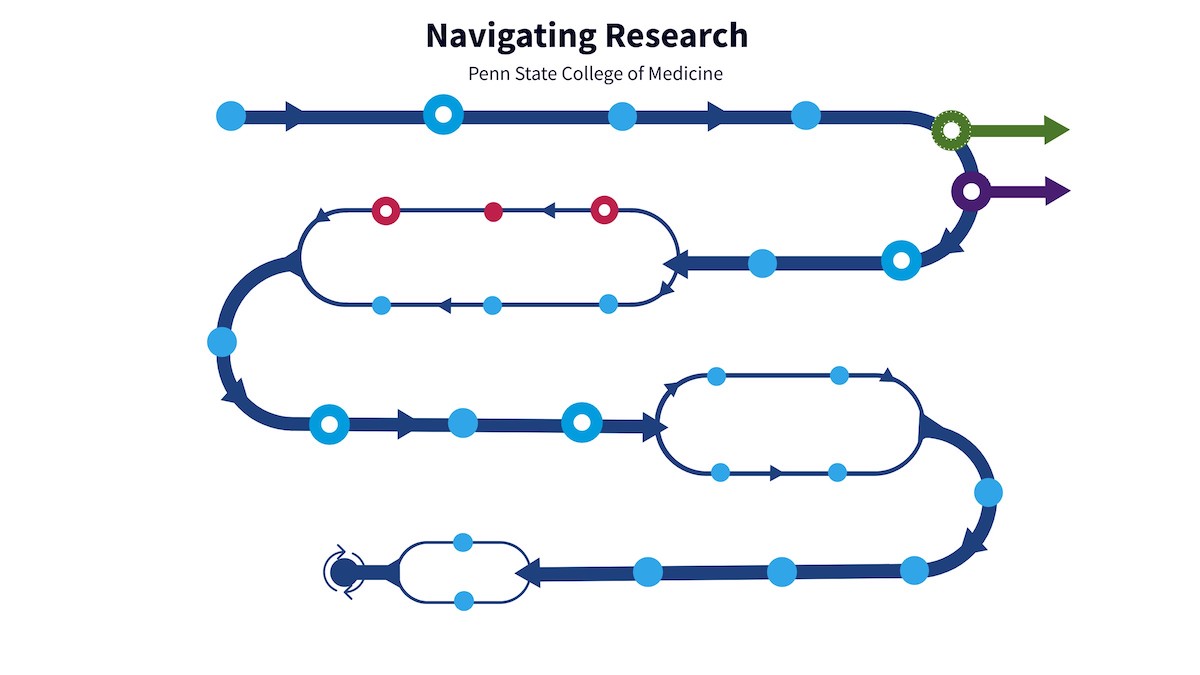Ensure Research Compliance
Ensure Research Compliance
Ensure Research Compliance
Ensuring compliance with proper protocols is an important part of the research process. Several programs at the Penn State College of Medicine help with this oversight.
Animal Resources Program
The Penn State College of Medicine/Penn State Health Milton S. Hershey Medical Center Animal Resources Program (internal access only) supports biomedical research at the Penn State College of Medicine by providing exceptional animal care, delivering state-of-the-art veterinary services, offering guidance for regulatory matters, and supplying practical animal-use training.
Learn More
Get Contact Info for Compliance Programs See Research Compliance Program Details(internal users only)
Biological Safety
The healthcare environment provides many opportunities for exposure to biological hazards, and the Biological Safety Program (internal access only) offers training and resources to prevent exposure. It is important to understand the hazards associated with biological agents and how to prevent exposure to faculty, staff, students, health system patients and visitors.
Chemical Safety
Nearly every work environment at Penn State College of Medicine or Penn State Health Milton S. Hershey Medical Center contains some form of hazardous chemical. The risks from exposure to most of these chemicals is quite small, but some chemicals represent a significant risk. The OSHA Hazard Communication Standard and the Pennsylvania State "Right-To-Know" Law mandate that you are aware of the chemical hazards in your work environment and be trained to minimize the risks they present, and information is available through the Safety Department (internal access only).
Conflict of Interest Review Committee/Conflict of Interest Program (CIRC)
As the ties between industry and academic medicine strengthen, and as translational research and the opportunities for technology transfer increase, so do the opportunities for real or apparent conflict between the personal financial interests of clinicians, educators, and investigators and their professional responsibilities. The Conflict of Interest Program and the Conflict of Interest Review Committee are responsible for determining when actual or potential conflict of interest does exist, and for eliminating, reducing, or managing the conflict in such a way as to encourage, support, and protect all legitimate research efforts as well as the integrity of our faculty.
Institutional Animal Care and Use Committee (IACUC)
The IACUC (internal access only) is responsible for oversight and evaluation of the animal care and use program and its components. Its functions include inspection of facilities, evaluation of programs and animal-activity areas; submission of reports to responsible institutional officials; review of proposed uses of animals in research, testing, or education (i.e. protocols); and establishment of a mechanism for receipt and review of concerns involving the care and use of animals at the institution.
Human Research Protection Program (HRPP)
The HRPP administers the institutional program to protect individuals who participate in research, provides administrative support to the IRB, and assists faculty and staff to promote the protection of the participants of research. HRPP staff provide guidance to investigators in the proposal process, design and conduct of human subjects research; develop educational resources and programs for research staff; and review research for quality purposes and compliance with applicable federal law and local policies.
Radiation Safety
The Radiation Safety Program or Health Physics Program (internal access only) at Penn State College of Medicine and Penn State Health Milton S. Hershey Medical Center has been developed by the Radiation Safety Committee, giving guidelines for certain aspects of the radiation safety program. The Health Physics Office oversees all activities involving radiation sources and is empowered to take whatever steps are necessary to protect patients, visitors, employees and the facility from unnecessary and potentially harmful radiation exposure and costly decontamination measures.
Research Quality Assurance
The primary mission of the Research Quality Assurance Office (internal access only) is to support the planning and conduct of both clinical research and basic laboratory research being conducted at Penn State College of Medicine. This mission is fulfilled by working with investigators to help them identify gaps that might negatively impact their research and assist them by making recommendations to eliminate these gaps. This support is provided to aid investigators in conducting research as required by regulatory authorities, to ensure that laboratory research follows acknowledged best practices, and that research fulfills promises to study volunteers and with due respect for laboratory animals.

